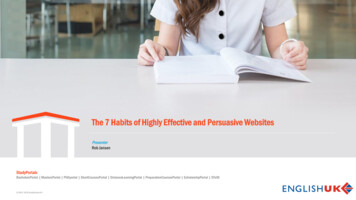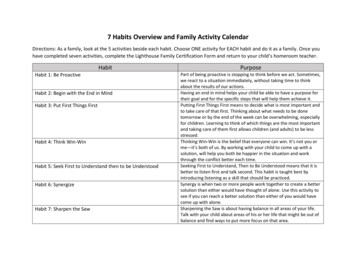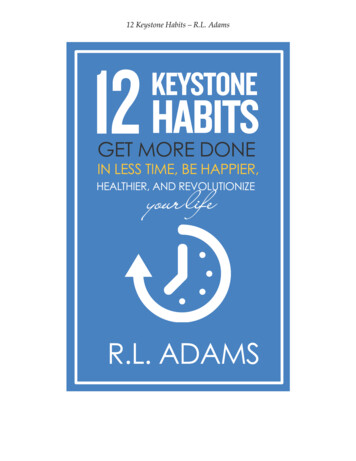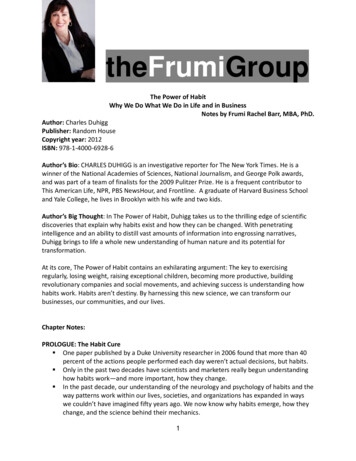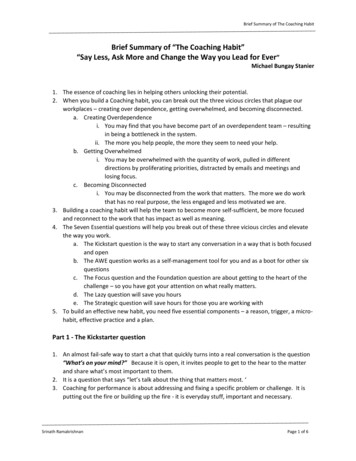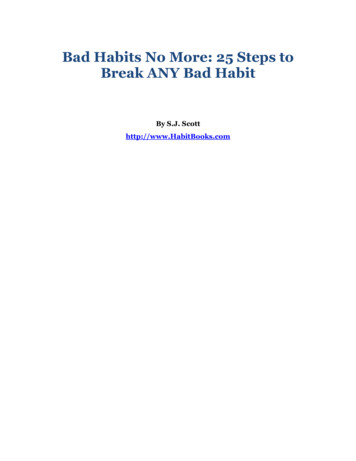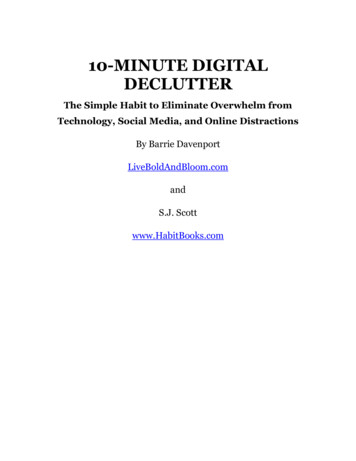
Transcription
10-MINUTE DIGITALDECLUTTERThe Simple Habit to Eliminate Overwhelm fromTechnology, Social Media, and Online DistractionsBy Barrie DavenportLiveBoldAndBloom.comandS.J. Scottwww.HabitBooks.com
10-Minute Digital Declutter Copyright 2015 by Oldtown Publishing LLCAll rights reserved. No part of this book may be reproduced in any form withoutpermission in writing from the author. Reviewers may quote brief passages in reviews.DisclaimerNo part of this publication may be reproduced or transmitted in any form or by anymeans, mechanical or electronic, including photocopying or recording, or by anyinformation storage and retrieval system, or transmitted by email without permission inwriting from the publisher.While all attempts have been made to verify the information provided in thispublication, neither the author nor the publisher assumes any responsibility for errors,omissions, or contrary interpretations of the subject matter herein.This book is for entertainment purposes only. The views expressed are those of theauthor alone, and should not be taken as expert instruction or commands. The reader isresponsible for his or her own actions.Adherence to all applicable laws and regulations, including international, federal, state,and local governing professional licensing, business practices, advertising, and all otheraspects of doing business in the United States, Canada, or any other jurisdiction is thesole responsibility of the purchaser or reader.Neither the author nor the publisher assumes any responsibility or liability whatsoeveron the behalf of the purchaser or reader of these materials.Any perceived slight of any individual or organization is purely unintentional.Publishing Services Provided byArchangel Ink
Your Free GiftAs a way of saying thanks for your purchase, I’m offering a free report that’s exclusive tomy book and blog readers.In 77 Good Habits to Live a Better Life, you’ll discover a variety of routines that can helpyou in many different areas of your life. You will learn how to make lasting changes toyour work, success, learning, health, and sleep habits. Tap Here to Grab 77 Good Habits to Live a Better Life
Table of Contents10-MINUTE DIGITAL DECLUTTERYour Free GiftPART I: INTRODUCTIONThe Dangers of Digital Clutter and Technology OverwhelmPART II: THE IMPORTANCE OF DIGITAL DECLUTTERINGWhy You Feel Overwhelmed by TechnologyWhy We Get Hooked on TechnologyHow Digital Dependence Damages Your LifeHow to Identify Your Life Priorities (beyond the Digital World)The Benefit of the Digital Decluttering Habit14 Advantages of a Digital Decluttered LifePART III: GETTING STARTED WITH DIGITAL DECLUTTERING6 Types of Digital ClutterDo You Have a Decluttering Problem? (21 Questions to Ask Yourself)8 Steps to the 10-Minute Digital Declutter Habit8 Actions for Starting Your First Decluttering Project7 Questions to Ask While DeclutteringPART IV: DECLUTTERING YOUR SOCIAL MEDIA ACTIVITIES17 Strategies to Minimize Your Social Media ActivitiesPART V: DECLUTTERING YOUR EMAIL INBOX8 Steps to Organize Your Email InboxPART VI: DECLUTTERING YOUR COMPUTERThe Truth about the Clutter on Your ComputerHow to Create a Simple File System6 Ways to Organize Your Folders and Files7 Steps for Creating a Minimalist Computer
PART VII: DECLUTTERING YOUR SMARTPHONE AND TABLETSmartphones: The Positives and the NegativesHow to Declutter Your Smartphone (8 Action Steps)8 Quality Apps to Add to Your SmartphonePART VIII: PROTECTING YOUR DIGITAL LIFEThe Importance of Protecting Your Digital LifeUse “The Rule of Three” for Your Digital Backups6 Simple Steps to Backing up Your Digital Life4 Concerns about Cloud-Based BackupsThe Importance of Creating Solid PasswordsPART IX: MAINTAINING YOUR DIGITAL DECLUTTER ACTION PLANThe Quarterly Digital Decluttering HabitDid You Like 10-Minute Declutter?More Books by BarrieMore Books by Steve
PART I: INTRODUCTION
The Dangers of Digital Clutter and TechnologyOverwhelmOnce upon a time, families sat down at a table for dinner in the evening and talkedabout their day as they ate.After dinner, children did homework using a pencil and paper, often looking up facts ina collection of hardbound books called “encyclopedias.” Meanwhile, Mom and Dadwould read a printed newspaper or gather around the radio to listen to the news or acomedy show. Sometimes the family would play a game, take a walk, or simply share afun activity together.If they needed to communicate with someone outside the home, they would write aletter, meet somewhere, or make a phone call from the single household phone.No one was texting, sexting, emailing, surfing, gaming, downloading, bookmarking,blogging, or podcasting. They weren’t watching TV, streaming video, or hopping fromone YouTube video to the next. There was no Facebook, Twitter, Instagram, Snapchat,Pinterest, or LinkedIn. In fact, the only form of instant communication was shouting toothers in the next room.In the last twenty-five years, we have drastically changed how we socialize, spend ourtime, do our work, and entertain ourselves. According to the Pew Research Center,today, eight in ten US adults (81 percent) say they use laptop and desktop computers athome, work, school, and everywhere in between. Meanwhile, 90 percent of US adultshave a cell phone, and two-thirds of those adults use their phones to go online.In a relatively short amount of time, the Internet has shifted from an occasional tool tothe primary way we work, communicate, and entertain ourselves. Recent researchreveals that the average time spent per week on email, text, and social mediais about 23 hours.
Although the amount of time spent online continues to grow, 62 percent of therespondents to the research survey stated they want to decrease the amountof time spent online in favor of more face-to-face interactions. Unfortunately,their actions contradict their desire to disconnect.It appears we’re obsessed with technology, and it’s impacting every aspect of how we liveour lives. We have become such slaves to the gadgets that were supposed to simplify ourlives. These days, we prefer the quick fix of instant information and low-qualityentertainment over real-world interactions and experiences.Just pull back the curtain on the new dinnertime ritual and you will see that everymember of the family is engrossed in their smartphone or tablet, checking email,texting, or playing a game in between forkfuls of food.Teenagers would rather chat by text or Snapchat than meet up in person. They’re toobusy taking “selfies” to coordinate togetherness. Children can look up any homeworkquestion online and get the answer in seconds without using much brain power. Afterdinner, family members often go to their separate rooms to spend time with theirpreferred electronic devices.Nowadays, we keep digital devices by our beds, take them to the bathroom,and have them within finger’s reach throughout the day.According to “Moore’s Law” (named after Gordon E. Moore, the co-founder of Intel), thenumber of transistors per square inch on integrated circuits doubled every year sincethe integrated circuit was invented, and he predicted this trend would continue for theforeseeable future. The pace slowed down a bit in later years, but data density hasdoubled approximately every eighteen months, which is the current definition ofMoore’s Law.That said, it’s important to recognize that technology has given countlessadvantages to our modern lives.
Both Steve and Barrie (the authors of this book) rely heavily on digital technology to runtheir online businesses. They owe most of their lifestyle freedom to the opportunitiesthat come from computers and similar devices.However, they also recognize the need for balance in their lives. Digital devices areconvenient, but they can also have negative effects on your time and energy.From inboxes congested with years’ worth of emails to thousands of unused computerfiles, your digital clutter can grow like untended weeds in a garden. These items canhave a similar negative impact on your life, similar to physical clutter in your home.When you’re buried under hundreds of old files, you’ll often experience feelings ofoverwhelm, anxiety, and confusion.Digital “stuff” also has an insidious way of occupying your time withnonessential activities that don’t make you feel any happier.The more time you spend surfing the Net, hanging out on social media, or playing amobile app game, the less time you have to hang out with your friends, enjoy nature, orsimply get more out of life.A digital-world addiction can be as destructive as other types of addictions. Compulsiveuse of technology interferes with your daily life, work, and relationships in a number ofways. When you spend more time with your online friends than your real ones, or youcan’t stop yourself from compulsively checking your email or social media, you’reallowing these devices to control you instead of the other way around.While it’s true that the information age is here to stay, there is a solution to finding thatbalance between using digital technology to your advantage and living life to the fullest.The solution will be detailed in the following book, 10-Minute Digital Declutter: TheSimple Habit to Minimize, Unplug, and De-Stress from Technology Overwhelm.About 10-Minute Digital Declutter
This book is for anyone who feels overwhelmed by the emails, media, documents,photos, videos, and apps that consume their daily life. It’s written for the person who isstarting to recognize the danger of “digital noise,” but doesn’t know how to live in thismodern world without experiencing the feeling of overwhelm.It’s also for those who need a system for the information they do want. Not only will youget back more time, you’ll also discover core strategies for maximizing the time youspend in the digital world.This book will be a good fit if you Feel overwhelmed by the sheer volume of information on your devices Can’t easily find the emails, documents, or websites you’re looking for Have little time to tackle a big digital declutter and organizing project Feel embarrassed and drained by the clutter and disorganization Find yourself afraid to delete anything for fear you might need it one day Feel yourself giving away too much time and energy to the virtual world Would like to change your priorities and learn to step away from your devicesmore often Get complaints from your boss, spouse, or family members about your digitalclutter or disorganization, or about the time you spend online Simply desire a more organized, minimalist lifestyleThe bottom line?If you have a desire to live an organized, simplified digital life—and to reclaim some ofthe time you spend with digital devices—then you’re reading the right book. Throughout10-Minute Digital Declutter, you will learn both the strategies to organize your devicesand how to make them part of a daily habit.Who Are We?
Barrie is the founder of an award-winning personal development site, Live Bold andBloom. She is a certified personal coach and online-course creator, helping people applypractical, evidence-based solutions and strategies to push past comfort zones and createhappier, richer, more successful lives. She is also the author of a series of selfimprovement books on positive habits, life passion, confidence building, mindfulness,and simplicity.As an entrepreneur, a mom of three, and a homeowner, Barrie knows firsthand howvaluable and life-changing it is to simplify, prioritize, and organize your physical anddigital life.Steve (or “S.J.”) runs the blog Develop Good Habits, and is the author of a series ofhabit-related titles, all of which are available at HabitBooks.com. The goal of his contentis to show how continuous habit development can lead to a better life.The main reason Steve felt inspired to write this book is that he is expecting his firstchild in March 2016. Like any father-to-be, he worries about the world his son will livein. Specifically, he sees the danger of being too reliant on technology pervasivethroughout society. His hope is to raise his children to leverage the digital world, but notallow it to dominate their lives.Together, we are the authors of the companion piece to this book called 10-MinuteDeclutter: The Stress-Free Habit for Simplifying Your Home.While we covered many strategies for simplification in our previous book, we barelytouched on the subject of digital clutter. So this book is a follow-up where we show youhow to organize your technology.As you can see, the following book is a collaborative effort between Steve and Barrie. Weboth provide information and knowledge from research, outside experts, and ourpersonal experiences.For instance, while writing this book, Barrie moved from Atlanta, Georgia, to Asheville,North Carolina, and went through the process of decluttering and downsizing her
possessions to live in a much smaller home. After completing the move, Barrie decidedto tackle the one project she’s avoided since becoming an online entrepreneur—decluttering and organizing her technology.After implementing the strategies we outline in 10-Minute Digital Declutter, Barrie hasnow embraced the idea that it’s equally important to keep her virtual world organized asit is to maintain a tidy, organized home.On the other hand, Steve comes to this book with a different perspective. Like manyproductivity enthusiasts, he’s always looking for shortcuts to save time.What attracted him to the concept of digital decluttering is the idea that any time savedwith technology is more time he’ll have to live life. So, in the past few months, he hasmade the conscious decision to identify the technology that’s truly important, and howhe can proactively ignore everything else.As you can see, we each have different experiences when it comes to minimizing ourdigital lives. By reading the following book, you will discover a wealth of actionableadvice that can assist your efforts at digital decluttering.Three “Housekeeping Items” to Keep in MindJust like we did in 10-Minute Declutter, we want you to keep three things in mind as youread this book.First, you probably noticed that we use the third-person tense (e.g., “Steveremembers . . .” or “Barrie suggests . . .”) when sharing anecdotes about our experiences.This was done specifically to make it easier for you to follow the narrative of the book.We admit it’s a bit clunky, but you will find it’s easier to grasp the information if youknow who is telling the story.Secondly, as mentioned earlier, digital technology evolves at an exponential rate. Itseems like as soon as an application is released, it quickly becomes outdated or replacedby a superior product. For that reason, we will often stick to more generalized
suggestions for managing your online information, and only offer specific suggestionsfor a tool if we believe it will be around for a long time.Finally, if you’re married or live with a partner, then you should share this book withthem. Perhaps you can work together to knock out these 10-minute declutteringprojects.If you have children who use digital devices, you can assign them short declutteringtasks that are easy and fun. This will teach them the importance of personalresponsibility and how to manage their own digital worlds. This is also a great time toteach your kids the value of disengaging from devices and spending more time in realworld activities and relationships.We have a lot of ground to cover, so let’s jump in and discuss why we are so devoted toour devices, and how that is impacting us.
PART II: THE IMPORTANCE OFDIGITAL DECLUTTERING
Why You Feel Overwhelmed by Technology“The constant dilemma of the information age is that our ability to gather a sea of datagreatly exceeds the tools and techniques available to sort, extract, and apply theinformation we’ve collected.”- Jeff Davidson, work-life balance expert, author, columnistWe’ve all experienced that feeling of overwhelm when it comes to the digital world.According to Dr. Daniel Levitin, McGill University psychology professor and author ofThe Organized Mind: Thinking Straight in the Age of Information Overload, humanbeings have created more information in the last ten years than in all recorded historyprior.Dr. Martin Hilbert and his team at the University of Southern California conducted astudy, published in the journal Science, to calculate the world’s total technologicalcapacity—how much information humankind is able to store, communicate, andcompute. What he found was startling. With the growth of the Internet, 24-hourtelevision, and mobile phones, we now receive five times as much information every dayas we did in 1986.However, this statistic pales in comparison to the growth of information we generatethrough email, social media, and text messages. Studies have shown that the averagesocial media user consumes 285 pieces of content a day, which equates to about 54,000words (the length of an average novel). We encounter one thousand clickable links andare bombarded by 174 newspapers’ worth of data a day just through social media alone.If it sounds impossible to read a full book each day, keep in mind that most people nowskim information instead of reading everything. The reason why? We simply have toomuch to consume on a daily basis.
With billions of people worldwide producing and consuming information, Dr. Hilbertand his researchers found that there are now 295 exabytes of data floating around theworld—that’s 29,500,000,000,000,000,000,000 pieces of information. This equates to315 times the number of grains of sand on Earth.The ability to process all this information has doubled every eighteen months withcomputers, and has doubled every two years with telecommunication devices. Accordingto Dr. Hilbert’s study, “In 2007, all the general-purpose computers worldwide computed6.4 x 10 18 instructions per second. This is in the same general order of magnitude asthe number of nerve impulses executed by the human brain in a single second.”It appears there’s no end to this exponential increase in information.As relevant, interesting, or important as the information might be for you or your work,it’s becoming increasingly urgent to create systems that allow you to sort the wheat fromthe chaff in the immediacy of the moment—before you are suffocated under a mountainof documents, blog posts, tweets, and text messages.The question is: “Why have we become so reliant on this technology?” We’ll answer thatin the next section.
Why We Get Hooked on TechnologyMost people love technology. It makes our lives easier, faster, and more expansive. Butthere is a diminishing point of return associated with our devotion to digital devices,and that point appears when we can’t separate ourselves from them.According to a Time Mobility poll, 84 percent of people worldwide said they couldn’t goa single day without their mobile devices. One in four people check their phone every 30minutes, while one in five check it every ten. Of adults aged twenty-five to thirty, 75percent said they took their phones to bed.It’s not just adults who are hooked. Children are plenty distracted as well.According to a Kaiser Family Foundation study, young people ages eight to eighteennow spend nearly every waking moment when they are not in school using media—morethan 7.5 hours a day.In an interview with Arianna Huffington, Richard Davidson, a professor of psychologyand psychiatry at the University of Wisconsin-Madison, says, “I think if we’re all honestabout it, we all suffer from attention deficit disorder, and it’s in part attributable to thekind of exposure we have to digital devices. The kind of feedback that we get from themis immediate feedback and it’s highly reinforcing, so it becomes like a drug. And in fact,it co-opts the same brain systems that are indicated in addiction.”The question here is, is it really possible to be addicted to the digital world? Thepsychiatric community is beginning to think so.In the 2013 edition of the Diagnostic and Statistical Manual of Mental Disorders,psychiatrists have decided to list Internet Use Disorder (IUD) as a condition“recommended for further study.” That means they haven’t decided yet whether IUD is alegitimate diagnosis requiring treatment, but might do so in the future.
(Source: American Psychiatric Association (2013). Diagnostic and Statistical Manual ofMental Disorders (Fifth ed.). Arlington, VA: American Psychiatric Publishing. pp. 797–798.)According to the definition determined by the American Psychiatric Association, IUD isan addiction to Internet gaming with an array of symptoms including a preoccupationwith gaming, withdrawal symptoms, loss of other interests and hobbies, and deceptionof family and friends about the extent of use.Internet Use Disorder is generally associated with online gaming, but you don’t haveto be addicted to gaming to fall into the spectrum of problematic orcompulsive use of digital devices. Many scientific studies expand the definition toinclude excessive, obsessive online use. Any virtual activities that interfere with normallife will fit the bill, including social networking, texting, blogging, email, excessive orinappropriate Internet pornography use, or Internet shopping.A 2014 study published in the journal Cyberpsychology, Behavior, and SocialNetworking suggests that the pervasiveness of Internet addiction differs markedlyamong countries and is inversely related to quality of life.Internet addiction is considered a national health crisis in China. According to an armypsychologist who runs a rehabilitation center in Beijing for Internet addicts, anestimated 14 percent of China’s youth are hooked on the Internet. It’s the first country inthe world to classify this diagnosis as an addiction. This addiction is the subject of a newdocumentary called Web Junkie, which follows the treatment of three Chinese teenagerswho so prefer the virtual world over the real one that their lives are severelycompromised.In a 2011 study, Chinese researchers studied eighteen young people who were addictedto the Internet and found reductions in their brain volume compared with the brainvolumes of non-addicts. The diminished brain regions of the Internet addicts includedareas thought to play a role in emotional processing, executive thinking skills, attention,and cognitive control.
Some people have suggested that the “theory of variable rewards” explainsour obsession with the digital world. This theory, created by Americanpsychologist and behaviorist B.F. Skinner in the 1950s, resulted from his study of labmice that responded more aggressively to random rewards than predictable ones. Whenmice pressed a lever, they sometimes got a small treat, other times a large treat, andother times nothing at all. Unlike mice that received the same treat with each leverpress, the mice that received variable rewards pressed the lever more often andcompulsively.In the same way the mice compulsively press the lever, we constantly check our emails,phones, and social media because the dopamine trigger in our brains compels us to doso. Like the mice, we sometimes get a small reward, sometimes a big one, andsometimes there is a spammy ad for Viagra. But one outcome is predictable for anyonewho compulsively uses digital machines—we inevitably compromise our lives, ourrelationships, and often our health in that search for our next “fix.”While you might not feel that technology negatively impacts your life, there have beennumerous studies that prove otherwise. In the next section, we go over this research andhow it demonstrates the dangers of being overly reliant on technology.
How Digital Dependence Damages Your LifeStill not convinced about the dangers of the digital world?Sure, you might spend less time with family and friends. Maybe you aren’t quite asresourceful or creative. But don’t the positive qualities of technology outweigh thenegatives?Of course, there are undeniable benefits to the digital world, but for those who spendhours each day connected, there are also major negative outcomes that can severelyimpact the quality of your life.Researchers at the University of Gothenburg in Sweden studied the habits of more than4,100 men and women, aged between twenty and twenty-four, and over the course of ayear found that those who constantly use a computer or their mobile phone can developstress, sleeping disorders, and depression.Says lead author of the study, Sara Thomee, “It was easy to spend more time thanplanned at the computer (e.g., working, gaming, or chatting), and this tended to lead totime pressure, neglect of other activities and personal needs (such as social interaction,sleep, physical activity), as well as bad ergonomics, and mental overload.”The study also found a correlation between stress and always being available on thephone, especially relating to feelings of guilt for not replying to messages. Using thecomputer late at night—and losing sleep as a result—was also a risk factor for stress andreduced performance.Other large-scale studies have reinforced the link between excessive computer use anddepression. Working alone on a computer can lead to a sense of isolation as workersspend less and less time interacting with other people.There are other health dangers to overuse of digital devices, including eye strain, backand neck muscle tension, carpal tunnel syndrome, obesity (from less exercise), and sleep
disorders. Sitting for too many hours a day is linked to heart disease, diabetes, andpremature death.Dr. David Greenfield, the director of the Center for Internet and Technology Addiction,suggests 90 percent of Americans fall into the category of overusing, abusing, ormisusing their smartphones, according to a recent survey he did in conjunction withAT&T. His research found that 98 percent of respondents said that texting while drivingis dangerous, but nearly 75 percent admit having done it. The National Safety Councilreports that cell phone use while driving leads to 1.6 million crashes each year. In fact,one out of every four car accidents in the United States is caused by texting and driving.Our reliance on technology and obsession with being constantly connected is clearlyharming our relationships.For instance, it was a wake-up call for Barrie the day her teenage daughter walked intoher office and said, “You tell me I shouldn’t spend so much time on the computer, butyou’re always on it now.” Barrie realized she wasn’t being a good role model, nor was shemaking it easy to have spontaneous, quality conversations with her daughter.Not only do our virtual distractions pull us away from real-world interactions, but theyalso compel us to interact in disengaged and thoughtless ways through text or email.Too many people choose an impersonal email or text to break off a relationship, sharebad news, or conduct arguments. The loss of real-world interactions makes it mucheasier to shoot off a thoughtless or hurtful text or email without the filter of lookingsomeone in the eye.Says Alex Lickman, MD, in an article for Psychology Today, “People are oftenuncomfortable with face-to-face confrontation, so it’s easy to understand why they’dchoose to use the Internet. Precisely because electronic media transmit emotion sopoorly compared to in-person interaction, many view it as the perfect way to senddifficult messages: It blocks us from registering the negative emotional responses suchmessages engender, which provides us the illusion we’re not really doing harm.”
When obsessive computer use interferes with your relationships, finances, or health—and you continue the excessive use despite efforts to control your behavior—then it’s aserious problem.Hopefully you aren’t at the point where your computer and smartphone have become anobsession that’s harmed your health or ruined a relationship. But you might relate to thetemptation to jump down the rabbit hole of endless information and entertainment.When the real world gets boring or stressful, that alluring virtual reality always awaits,tempting you to log in and tune out.One way to loosen the grip of online overload and obsession is by creating the dailyhabit of decluttering your devices. We’re here to help you do just that, and, as you’lllearn, decluttering has a surprising effect on your time and energy. In the next section,we’ll talk about the importance of identifying what you truly want and how this relatesto the technology you regularly use.
How to Identify Your Life Priorities (beyond theDigital World)We’d like to make a bold assumption here.You probably have a secret desire to create boundaries around the excess digital clutterin your life. If you feel exhausted by the constant information overload and long tobetter manage the time you spend online every day, then what you need to do isreevaluate the priorities in your life.It’s not enough to say, “I’ve cleaned off my desktop and emptied my email, so now I’morganized and have more time.”You also need to create a “manifesto” for your digital life that defines the scope of how itwill be used on a day-to-day basis. As the digital world becomes increasingly pervasive,this manifesto will help you stay committed to your important values and top priorities.Think of it this way: If you add up the time spent on each digital device, every day, thenyou probably have a closer relationship with the virtual world than you have with yourspouse, children, or friends.You know there’s something wrong with this balance, and yet you still find yourselfflipping open the lid or gazing at your iPhone whenever you have a moment to spare—oreven when you don’t.Is this really how you want to live your life?Our bet is that you want more than what your digital devices can offer, and this desirefor more, can motivate you to define exactly how you want to spend your time.To start, we suggest answering three simple questions: What do y
today, eight in ten US adults (81 percent) say they use laptop and desktop computers at home, work, school, and everywhere in between. Meanwhile, 90 percent of US adults have a cell phone, and two-thirds of those adults use their phones to go online. In a relatively short amount of



